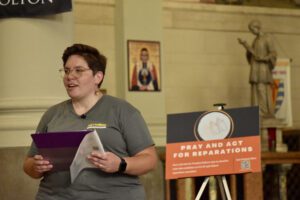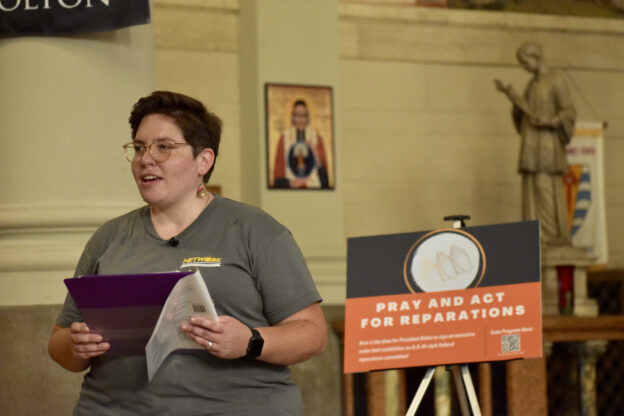
We Do Not Live Single-Issue Lives
The Struggle For Justice Calls on All People To Recognize Our Interconnection
Sr. Eilis McCulloh, HM
October 8, 2022
As an undergraduate student, my history classes introduced me to the activism of the 1960s: civil rights, voting rights, women’s liberation. I distinctly remember listening in awe to a guest speaker who marched with Martin Luther King, Jr. and thinking, “Wow, to have been a part of something that changed the course of this country…”
I naively thought that the era of fighting for our rights had passed, that we were on the right side of the moral arc of the universe. Of course, this is far from the case. The last six years have shown us that la lucha sigue, the struggle continues. Except now it’s more existential than it’s been at any time in my life, or even in my parents’ lifetimes.

Sr. Eilis McCulloh, HM, a NETWORK Education and Organizing Specialist, speaks at a reparations vigil at a parish in Cleveland in June 2022.
It’s 2022, and I can’t believe that we’re fighting for the future of democracy. I had thought that was put to rest with the defeat of fascism in World War II, the passage of the Voting Rights Act of 1965, and the collapse of the Soviet Union in 1991. But no, we somehow face an onslaught of people in the U.S. who think that we should abandon the practice of upholding free and fair elections, and their vision of this country beyond elections are equally chilling.
The result is a long list of things I’m continually surprised to find myself advocating for today. We’re still fighting for voting rights, for an end to systemic racism, for immigration reform, for the acknowledgement of — let alone meaningful action on — climate change, for indigenous rights, for access to adequate health care, housing, and nutrition. In 2022, it’s easy to ask incredulously, how did we get here!?
In his Sept. 1 address in Philadelphia, President Biden said that “blind loyalty to a single leader” is a lethal threat to democracy. And renewed attempts to suppress the vote and overturn elections, and stripping away rights for all people, but especially women and non-white people, bears this out. But another blind loyalty to a single candidate or policy has also abetted this corrosive process. It’s the decades-long phenomenon of people, especially many Catholics, who engage in single-issue voting as their primary political engagement rather than working toward the common good.
Father Bryan Massingale offered the best rebuttal of this: “The crises that face us — militarism, racism, ecology and poverty — are interlocking, overlapping and compounded. … Single- issue groups and struggles will be neither effective nor compel people’s attention. To paraphrase the great Audre Lorde [a 20th-century Black writer and civil rights activist], many people do not have the luxury of engaging single-issue struggles because they — we — do not live single-issue lives.”
I would go a step further: Single-issue voting is conveniently racist. It’s like wearing blinders; it blocks out one’s view of the peripheries. To ignore systemic racism is to ignore active attempts at voter suppression and the lack of equal representation in our politics. Granting power to single-issue voters means that we silence the building up of inclusive communities. The rights of people of color, women, immigrants, indigenous peoples, LGBTQ+ community, and any other minority community are whittled away in the name of single-issue voting.
As Pope Francis reminded us in his 2018 letter in Gaudate et Exsultate, “Rejoice and Be Glad” that the lives of all people who are marginalized in our communities are “equally sacred.” That includes all kinds of people who are already born: people in poverty, people who are ill, the elderly, and victims of human trafficking. This is the call for all people: If we continue to only focus on a single issue, we will be responsible for the fall of our democracy, for the death of our planet.
The bitter fruits of the insurrection, blatant racism in our institutions and policies, election deniers, and attempts to suppress the vote should scream out to us. They beg of our attention. We must call on all people of faith and goodwill to be multi-issue voters and work to uphold and advance Gospel values.







